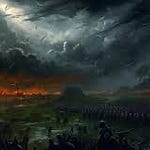Some men are born into war. Others have war thrust upon them. Ulysses Penhaligan is both.
There was once a time when he had a future, the kind promised to young men of good breeding and impeccable bloodlines. A name like Penhaligan carried weight in the drawing rooms of England. An Eton boy. A future captain of industry, or politics, or empire. But all of that came to ruin the night he was discovered in flagrante delicto with a housemaster, his father’s shame too great to be borne. No son of mine. No heir to this name.
So, he did what exiled men do. He disappeared into the filth.
He found his way to the East End, a world away from privilege, where blood bought silence and the law was whatever the strongest man in the room decided it to be. He joined the Metropolitan Police, walked the gutters where the real battles were fought. And then came the war.
The Somme ate him alive. It took everything that made him human and left something else in its place. Four years in hell. Four years of mud, gas, screaming, and watching men die in ways so grotesque it made the devil himself recoil. And on the final day of that great slaughter, he found himself in a crater filled with blood and shattered bone, face-to-face with a German soldier who should have killed him. But didn't.
The war ended, but Penhaligan did not return home. Because home was gone. The London he returned to was not the city he left. The men who survived the trenches no longer fit into polite society. Some drank themselves to death, some disappeared into crime, and some—like Penhaligan—found another war to fight.
Now, in 1919, the city stinks of rot. War widows line the streets, cripples beg outside the houses of Parliament, and the rich toast the new decade as if it were a victory they alone had won. And in the darkness, something moves.
The first body is found floating in the Thames, mutilated beyond recognition. Then another. And another. The killings are not random, not frenzied, but methodical. Surgical. Whoever is doing this has skill, patience. The police, ever indifferent to the plight of London’s underclass, ignore it. Until a woman of standing—a name that does matter—turns up dead. Then, and only then, do they summon The Ghost Squad.
It is not a badge of honour. It is a death sentence.
The squad is made up of men the force cannot stomach but cannot let go—criminals, drunkards, the disgraced. Penhaligan. Farquhar. Talbot. A triumvirate of men too broken for polite society, too dangerous to be left alone. Their job is to hunt the untouchable, to tread where Scotland Yard will not, to do what must be done—quietly, without fuss, and with the full knowledge that if they die in the line of duty, no one will mourn them.
But as Penhaligan begins his investigation, the old ghosts return. The precision of the mutilations, the care taken with each kill—he recognises this work. It is not the butchery of some madman. It is something else. Something foreign. Something trained.
And then, in a moment of hideous clarity, the truth strikes him like a bullet to the brain.
He has seen this before. In the war. In the crater. In the face of a man who should have killed him—but didn’t.
And now, that same man walks the streets of London, finishing what the war did not.
The hunt has begun. The past is watching. And this time, there will be no battlefield, no trenches to cower behind. Just a killer, a city teetering on the edge, and one man who has already died once—and knows he can’t afford to die again.
---
Fiction is War—And I Am Still Fighting
Anyone who tells you that writing is easy has never written a word worth reading.
Fiction is war. Not the sort that drenches battlefields in blood, but the kind that takes place in the mind, in the quiet, in the stillness—if stillness is ever truly achievable. It is a battle not against the blank page, but against yourself. Against fatigue. Against doubt. Against the noise of the world that insists on creeping into the sanctum of your imagination.
It requires discipline, but more than that, it requires a quiet mind—a mind unpolluted by the nonsense of the day, the trivialities that distract, the exhaustion that seeps into the bones like a slow rot.
And I have not had a quiet mind for some time. My mind is a cacophony of noise. Sometimes it can be filtered, other days, I have to succumb to it, letting the tide wash over me, knowing that fighting against it is futile.
Since my heart attack last year, writing has been an exercise in survival. There is a difference between wanting to write and being able to write, and I have learned that the hard way. The words don’t come like they used to. The clarity of thought, once sharp as a scalpel, now flickers in and out. Some days, I can feel the rhythm, sense the story just beneath the surface. Other days, it’s like trying to hold water in cupped hands, watching it slip away no matter how hard I try to grasp it.
"Writing is a form of therapy; sometimes I wonder how all those who do not write, compose, or paint can manage to escape the madness, melancholia, the panic and fear which is inherent in a human situation." —Graham Greene
Fiction has always been my sanctuary, my way of making sense of a world that is often brutal, indifferent, and unwilling to yield its secrets. But the act of writing—the mental weightlifting of it—is a different beast altogether. It is a process that demands absolute focus, sustained attention, and an unshakable will to wrestle the chaos of the mind into order. And that is where I struggle.
I love the use of words. Words are permanent, they span the tides of time, they remain long after we have turned back to the earth. It’s these words that I love to craft—to string the sentences together in a way that makes sense, in a way that has the power to change the world. Writing, for me, is the gift of life. Something I mourn each day. Like a painter losing their eyesight, like a singer losing their gift of voice, like a soldier with no war left to fight—writing is my gift, my purpose, and each time I smith the words, I am changed.
My focus is fractured. My stamina is fleeting. My ability to hold onto a single thought long enough to sculpt it into something meaningful is a fight I do not always win. Fiction is exhausting at the best of times—but after a brush with death, it becomes a monstrous thing, something that both calls to you and terrifies you in equal measure.
But Penhaligan remains.
Through all of it—through the haze, through the exhaustion, through the frustration of not being able to write as I once did—Penhaligan waits.
I don’t know why the name gripped me the way it did, but from the moment it entered my mind, it refused to let go. Penhaligan–the word conjures up something palpable, something exquisite, something weighted with history. It tastes like ink on an old constabulary ledger, like something that should have been lost to time but wasn’t.
And he is not just a name. He is a synthesis. A man who, in many ways, is made up of the things I know, the things I have lived, things that I feel, the things that have shaped me.
There is a reason I write about broken men. Men discarded by society, men pushed to the fringes, men undone by war, by violence, by fate itself. I have always been drawn to those who survive in spite of everything. Those who claw their way through the darkness, because they have no other choice.
And then there is the setting—the early 20th century, the First World War, the fragile, teetering world that followed. I do not know why this period stirs something deep in my imagination, but it does. The geopolitical quagmire, the lingering wounds of war, the great unravelling of empires—it is all fertile ground for storytelling.
I have always preferred the dark stories, the ones that linger, the ones that make you uncomfortable. The ones that ask questions people would rather ignore. The ones that remind us how thin the veil of civilisation truly is. There is a truth in the darkness of the human psyche, a darkness that pervades us all.
And The Ghost Squad? Well, that was a gift.
A half-remembered truth. A whisper in the dark. A real unit, buried in the shadows of history, created to do the work that Scotland Yard could not. A handful of men, unwanted by the system but too valuable to discard entirely. A squad of ghosts, fighting battles that were not meant to be fought, cleaning up the messes that the respectable classes wished to pretend did not exist.
It was too rich a vein not to tap. Too compelling a tale not to tell.
"There is nothing to writing. All you do is sit down at a typewriter and bleed." —Ernest Hemingway
So I write. When I can. When my mind allows it. When the fog clears enough for me to step back into Penhaligan’s world, a world of blood and smoke and men with nothing left to lose.
I do not know how long it will take. I do not know if the words will come as easily as they once did. But I do know this:
Penhaligan is waiting.
The past is watching.
And the hunt is far from over.
If you’re ready to meet The Ghost Squad, stay with me.
The war is just beginning.












Share this post